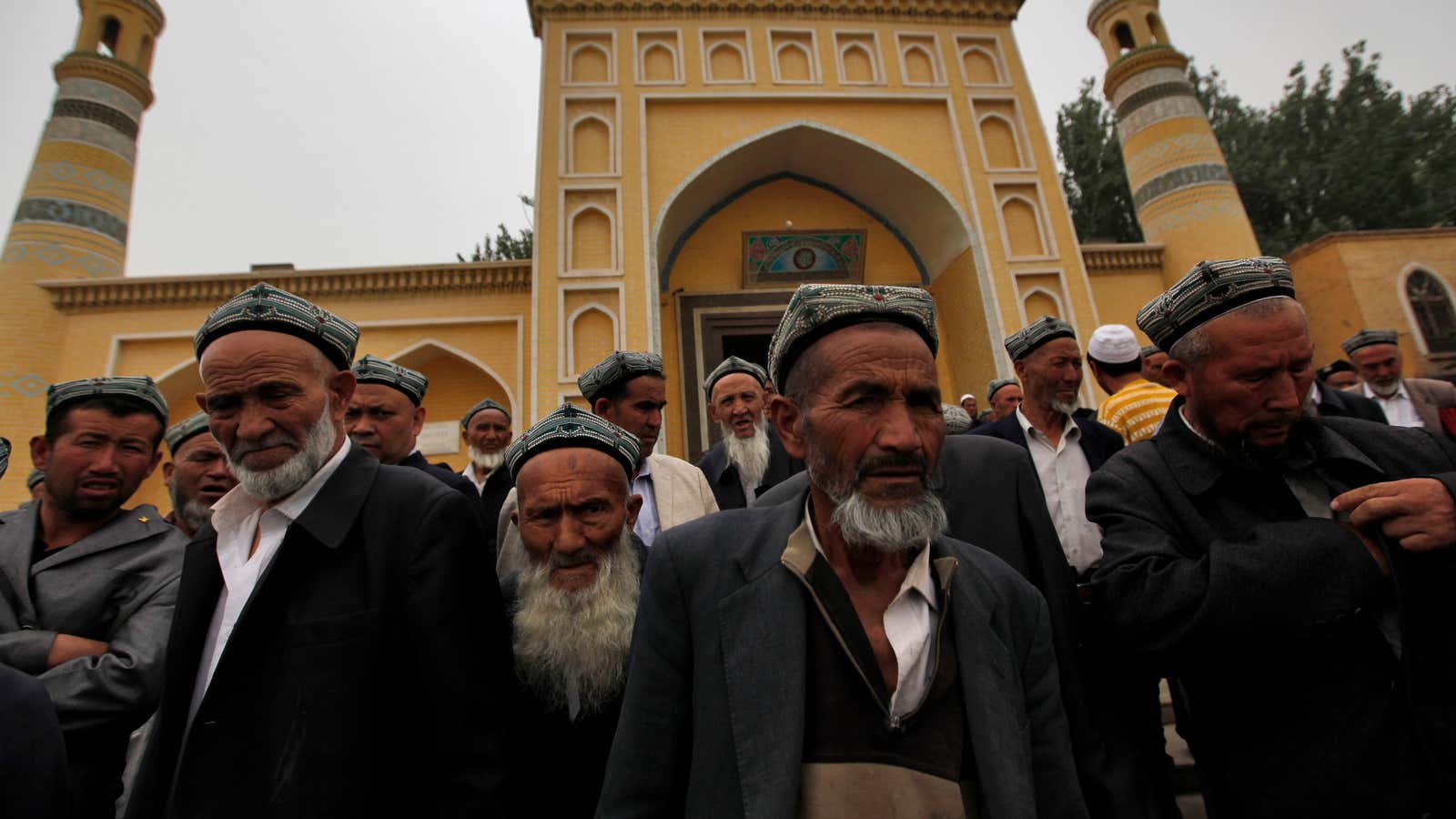For months, foreign media have relentlessly reported on the mass incarceration and cultural suppression of China’s Muslim Uyghur minority in the far western Xinjiang region—allegations that Beijing just vehemently denied in a global forum for the first time.
At a meeting of a United Nations human rights panel today (Aug. 13) in Geneva, a Chinese delegation categorically said there was no such thing as “re-education centers” in Xinjiang nor was there any subjugation of religious freedom in the Muslim-majority region. China’s response comes after the UN Committee on the Elimination of Racial Discrimination (CERD) said on Friday (Aug. 10) that there were “credible reports” that 2 million Uyghur and Muslim minorities in China are being held in secret internment camps.
A Chinese representative said that some minor offenders of religious extremism or separatism have been taken to “vocational educational and employment training centers with a view to assisting in their rehabilitation,” which had achieved success in correcting their beliefs. Even those people’s rights, said the representative, are “duly protected.” Xinjiang saw deadly ethnic riots break out in 2009, and officials also blamed Uyghur militants for a knife attack at a train station in 2014 that killed 29.
The Chinese delegation more broadly denied that there was arbitrary detention, excessive use of force, and torture of ethnic minorities elsewhere in the country, mentioning specifically that the rights of Tibetan language activist Tashi Wangchuk (paywall), who was sentenced to five years in prison in May, were upheld. Another Chinese delegate extolled the freedoms accorded to Tibetans in China, a region that has also seen repression over China’s fear of separatism.
Despite Chinese authorities’ suppression of information about the alleged internment camps, by restricting the movement of Uyghurs and limiting access of foreign journalists to the area, more and more information about them is trickling out of China. One source of information has been Uyghurs or other Muslims living overseas, most notably an ethnic Kazakh Chinese citizen (paywall) who escaped from one such camp in Xinjiang, and was put on trial last month in Kazakhstan for illegally entering the country. The woman testified to the existence of camps where Muslims were forced to attend patriotic education sessions lauding the Chinese Communist Party.
And a submission from Chinese Human Rights Defenders to the committee cited government data showing that a fifth of all criminal arrests in China in 2017 took place in Xinjiang, despite the region only being home to a little over 20 million of China’s 1.3 billion people.
The Chinese delegation at the UN reiterated many times that not only Muslims in Xinjiang, but ethnic minorities across China enjoy religious freedoms and have benefited from targeted economic policies aimed at improving their livelihoods. In response to allegations that Chinese authorities have systematically tried to suppress Uyghur culture, such as by banning beards, veils, and certain Muslim names, a Chinese representative said, “Wearing masked robes is also prohibited in many other countries in the world.”
The suppression of Muslim groups also extends beyond the Uyghur ethnic group, with the Hui Muslims—who are part of the dominant Han Chinese ethnic group and thus more assimilated—also increasingly in the crosshairs. Following an attempt by authorities to demolish a major mosque in the Ningxia autonomous region last week, Hui Muslims staged a rare protest that resulted in authorities backing down.
The World Uyghur Congress, a Berlin-based group that represents Uyghurs exiled abroad, rejected all of the Chinese delegation’s statements, for example highlighting that Beijing has systematically tried to eliminate the Uyghur language despite China’s stance that it has dedicated substantial funds to providing bilingual education to ethnic minorities:
The hearing at the UN in Geneva came on the same day as the publication of an opinion piece by state-run tabloid Global Times that defended the central government’s policies in Xinjiang. It didn’t refer to the allegations of mass internment of the Uyghur population, instead aiming its ire against the allegations of massive human rights violations directed by “Western countries” against China.
The tabloid said that the high level of security in Xinjiang, such as the “police and security posts” that can be seen across the autonomous region, have been successful in keeping extremism at bay. China has successfully avoided the turmoil of Syria and Libya, it said.
Observers in the West, the paper added, fail to understand that such measures are a “phase that Xinjiang has to go through in rebuilding peace and prosperity” before it can “transition to normal governance,” and are instead “smearing” Chinese governance in Xinjiang.
In response to the Chinese delegation’s comments on Xinjiang, UN CERD’s co-rapporteur Gay McDougall said, “We need more than a denial of allegations.”
